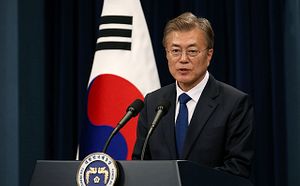At the Armed Forces Day ceremony held on September 28, South Korean President Moon Jae-in revealed his intention for an early retrieval of South Korea’s wartime operational control. During his speech, he said that South Korea “should have wartime operational control to instill fear in North Korea and win the trust of the citizens,” and that “retrieving wartime operational control will boost military development and place South Korea at the center of East Asian security, based on independent defense capabilities.”
His remarks came prior to the national government audits which began on October 13. The topic became a top priority issue every time military agencies were put before the inspectors.
One of the major concerns raised during the audits was whether early transition of wartime operational control would weaken the U.S-ROK alliance. During the audits on the Ministry of National Defense, Liberal Democratic Party(LDP) assemblyman Baek Seung-joo said that “it is questionable whether the President’s public remarks on the early retrieval of wartime operational control during the Armed Forces Day ceremony was appropriate for the U.S.-ROK alliance to operate properly.”
In contrast, ruling Minjoo Party of Korea(MPK) assemblyman Woo Sang-ho said that “the destabilizing factor here is the perception that the retrieval of wartime operational control may weaken the U.S.-ROK alliance.” He added that “a good persuasion is needed to claim that the retrieval will in fact expand war waging capabilities.”
The Ministry of National Defense responded that within a month South Korea and the United States will decide upon a plan to build a future combined forces command in which a South Korean four-star general will sit as commander with a U.S. general as vice commander. General Kim Byung-joo, Vice Commander at the Combined Forces Command, said that “[the transition of wartime operational control] is based on a mutual agreement [between the U.S. and ROK],” adding that “the U.S.-ROK alliance is stronger than ever. South Korea will continue to be protected under the framework of U.S.-ROK alliance both before and after the transfer of wartime operational control.”
Another outstanding issue that was brought up during the audits beyond the impact of an early transfer was the motivation for such a move. Independent assemblyman Lee Jeong-hyun said during audit hearings with ROK Joint Chiefs of Staff that early transfer of control is an “act that deceives the public,” claiming that “the public is concerned because the current transfer scheme is based on a political motive.” LDP assemblyman Jung Jin-seok added that the military “should confine their scope of judgement on military affairs only, and should not be swept away by political decisions,” saying that “it is yet premature to conduct transfer of wartime operational control at this time.”
As a response, MPK assemblyman Woo Sang-ho said that “the current plan of transferring wartime operational control has also been pushed by former President Park Geun-hye,” adding that “the military is merely following what has been agreed upon ever since.” ROK Joint Chief of Staff Chung Kyung-du also said that the issue has “been dealt with by series of former U.S. and ROK leaderships, so the U.S. and South Korea are currently working closely to further consolidate the plan, rather than going against it.”
The debate on transferring wartime operational control has been on the table for a decade since the days of the Roh administration back. Originally, the plan was to designate a certain date for the transfer. However, after series of delays, the U.S. and South Korea agreed in October 2014 at the 46th Security Consultative Meeting that the transfer will be made when certain conditions are met, postponing the transfer indefinitely.
The conditions for the transfer include securing critical ROK and alliance military capabilities to lead combined operations, the ability to respond to the North Korean nuclear and missile threats, and a security environment on the Korean Peninsula and in the region that is conducive to a stable transfer of wartime operational control.
Operational control is the right to control military operations. It is mainly divided into peacetime and wartime operational controls. By default, operational control is delegated to the head of a sovereign state, but South Korea delegated its operational control to General Douglas MacArthur, the then-commander of the United Nations Command, on July 17, 1950, immediately after the outbreak of the Korean War. South Korea retrieved its peacetime operational control in December 1994, but wartime operational control is still delegated to the commander of Combined Forces Command, a U.S. general.

































